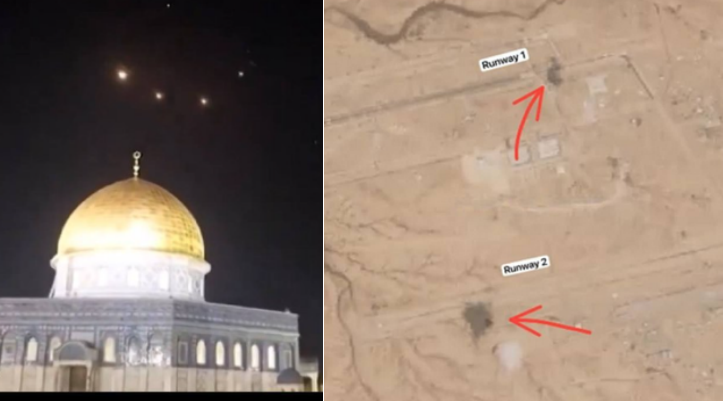

by John Helmer, Moscow
@bears_with
Triumphalism and self-promotion by US alt-media generals (er, colonels, majors, lieutenants) and Donald Trump contribute nothing of value to the Russian analysis of the Iran’s operation against Israel on Saturday night, April 13. That’s to say, analysis, not of who has gained, who has lost, but of what there is to be learned for fighting the next round.
Not much, a Russian military source intimates. “A lot of fireworks but no real damage. The Iranians let it be known they wouldn’t go beyond fireworks . The panic and stampede like the situation in Jerusalem once again shows how jittery Israel is. But the Iranians have no fight left against this enemy – the last six months have shown it.”
Not much — a North American military source agrees. “I think it was a lot of noise-making all round. The Iranians telegraphed, then pulled, their punch. They did the same thing in January 2020 with Operation Martyr Soleimani. A lot of noise was made about ‘punishment’, ‘revenge’, etc., while, at the same time, signals were sent to the enemy stating that an attack is imminent, is retaliatory in nature and not to be seen as escalatory. This is how the Iranian Government saves face while, in their mind, avoiding a direct major conflict which would certainly threaten their continued rule.”
In public at least, and for the time being, this is not the assessment of the leading Russian military blogger, Boris Rozhin, author of the Colonel Cassad short-read Telegram and longer-read Live Journal. His isn’t the place — nor is this — to anticipate the assessments under way at the General Staff and Kremlin, or to report how they are gauging the impact of what has just happened on Russian operations in the Ukraine war, if any.
A small exception can be made for the Kremlin’s “I told you so” following Trump’s Schnecksville declaration on Saturday. “God bless the people of Israel,” Trump said. “The weakness we have shown is unbelievable and would not have happened if we were in office… America prays for Israel. We send our absolute support to everyone who is in harm’s way…We will restore America’s strength at home.”
Schnecksville, Pennsylvania, is where Trump said this at a voter rally. He’s unlikely to know that the meaning of the Yiddish word, schneck, is a sluggard, an idler: Schnecksille is Bum’s Town. Trump’s statement there confirms part of the reason for President Vladimir Putin’s February 14 declaration of preference for Trump to be defeated in the US president election in seven months’ time.
For public discussion in Moscow, there remains to be clarified why the Iranian drone wave, missile wave combination failed so much more comprehensively than the Russian operational method in the Ukraine. “The IDF [Israel Defence Forces] claims 99% of downed targets, the IRGC [Islamic Revolutionary Guard Corps] claims 50% of successful hits (meaning ballistics),” Rozhin sums up. “It is obvious that Israel will in every possible way downplay the consequences of the strike and hide the victims and destruction, as this is a matter of military prestige. It is obvious that Iran will exaggerate the consequences of the strike as much as possible and carry out active information activities aimed at increasing the military prestige of the IRGC and the Iranian Armed Forces.”
“Israel is now at a fork in the road. To strike directly at Iran means to receive a retaliatory missile strike, an even more powerful one, which is guaranteed to penetrate the Israeli air defence system. At the same time, the United States has already stated that it will not take part in attacks on Iran, hinting that Israel should limit itself to something like the usual strikes against Hezbollah and Iranian proxies in Syria. Similarly, the European satellites of the United States actually warn Israel against attacks on Iran. But this, of course, will be perceived in Israel itself as a sign of weakness, because Iran has shown that it can directly strike directly at Israel, which is the intersection of all Israel’s red lines.”
On the published Israeli counts to date, Iran fired between 180 and 185 drones, 30 to 36 cruise missiles, and 110 to 120 ballistic missiles; click to read the calculations reported by the New York Times and the local Israeli media. seven of the missiles are claimed in some Russian reports to have been hypersonic, but this is not corroborated and unlikely.
“The operation achieved a level of success that exceeded our expectations,” according to IRGC commander, Major General Hossein Salami.
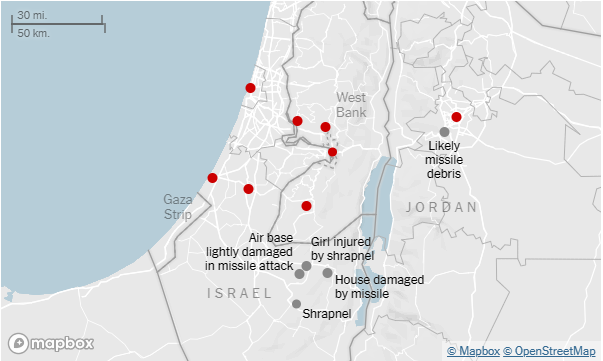
Source: https://www.nytimes.com/
In its advertisement for Israel’s military capacities and export markets for its military hardware, the Financial Times of Tokyo and London concluded the outcome is a “resounding strategic failure for Iran [and] collapse of a central tenet of its [its] power projection — its conventional missile and UAV arsenals.”
Boris Rozhin’s reporting of the launches announced by Iran, overflights across Iraq and Syria and strikes reported by the Arab media, led the Moscow coverage over the weekend. Here is a verbatim English translation of his assessment published on Sunday.

Source: https://colonelcassad.livejournal.com/
Iran’s Strike on Israel
By Boris Rozhin
1. Iran was solving the task of implementing retaliatory measures for the Israeli strike on the consulate in Damascus. Iran could not help but respond, as this would have meant showing weakness, even within the framework of the general Iranian strategy. And that is why it was impossible to do without the usual strikes by Iranian proxies from Syria, Iraq, Lebanon, and Yemen, with which Iran habitually responded to Israeli attacks on its proxy forces. It was precisely pulling Iran into a direct strike that Israel sought by attacking the Iranian consulate [in Damascus on April 3], spitting on the Vienna Convention.
2. As part of its strategy, Iran has set the task of implementing a direct response, with strict boundary parameters. The strike should not be too weak, so as not to give the impression that Iran is imitating a response, but at the same time not too strong, so as not to make an Israeli retaliatory strike inevitable, and if it does happen, then make Israel guilty of the subsequent escalation. Hence the observable character of the night strike.
3. From the diplomatic point of view, Iran has justified its strike by international law on retaliatory actions in connection with the attack on the consulate. From the point of view of the established international law, Iran was in its right to strike. But the problem is that international law has not worked for a long time, and that within the framework of the “rules-based world order”, there can be no strikes against Israel, and Israel can attack anyone it wants. Yes, this is the bastard order which the United States is trying to preserve, and Russia and China are trying to destroy.
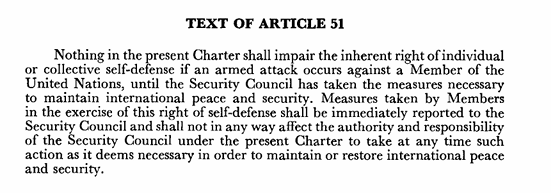
United Nations Charter source: https://legal.un.org/
The Iran Embassy to the UN formally invoked Article 51 for the strikes in its letter to the UN Security Council of April 13: https://twitter.com/Iran_UN/
4. The limited nature of Iran’s strike in its structure was identical to the strike on the American base of Ain al-Assad in [January 20] 2020 in response to the killing of [Iranian Major-General Qassem] Suleimani and [Iraqi Shia leader Abu Mahdi al-] Muhandis by the Americans in Baghdad [January 3, 2020]. The approximate time of the strike, the approximate flight directions of missiles and drones, the nature of the selected targets (military), and the boundary response conditions were notified to all the interested players. In this regard, Iran deliberately abandoned any attempt to achieve operational and tactical surprise, and relied precisely on a targeted frontal penetration of the Israeli air defence at the promised time. Since there were no objectives to start a full-fledged war, the strikes of Hezbollah, Ansar Allah and Iranian proxies in Syria and Iraq were of a limited auxiliary nature.
5. It is important to understand that Israel was not alone in resisting the Iranian attack – the US Air Force and US ground surveillance stations, the British and French Air Forces, and the Jordanian air defence took part in repelling the attack. Some of the missiles and drones were shot down on approach. In fact, there was massive testing of the consolidated air defences of the United States and Israel in the Middle East in conditions when this air defence could prepare for a strike 72 hours before it was launched.
6. The number of launched drones and missiles is of key importance. Iranian sources said about 115 missiles were fired; the US and Israel, about 200+ missiles. Plus, according to various estimates, there were from 150 to 400 or even 500 drones. Objective data are still insufficient to determine the actual number of launched missiles and drones. In addition to these missiles and drones, Iran launched various decoys and old-model missiles to score off the enemy air defence systems. Iran also used missiles with separable warheads, which could also be counted as separate missiles.
7. If we talk about the general objectives of the strikes, the IRGC states that the purpose of the attack was to break through the Israeli air defence system and defeat the [Nevatim] airbase from which the consulate in Damascus was attacked, as well as the Mossad intelligence facility [in Tel Aviv] involved in organizing the attack on the consulate. The choice of targets also shows Iran’s mindset for a limited response. In the event that the aim was to ‘burn its bridges’, Iran would certainly have set its task to ensure the destruction of the Dimona reactor and buildings in the government quarter in Tel Aviv, starting with the Knesset. The tactics of the strikes provided for a synchronized strike by drones, cruise and ballistic missiles in order to achieve guaranteed penetration of the consolidated air defence system of the United States and Israel. Therefore, ballistic missiles were launched at Israel shortly before the entry of the bulk of drones and conventional missiles into Israeli airspace. The main striking force was the latest Heidar ballistic missiles — range 2000 kilometres, warhead 1.5 tonnes, protection from the effects of electronic warfare plus optional separable warheads. Their task was to break through to their intended targets, hiding behind a cloud of drones and cheap missiles which were supposed to overload the Iron Dome, Patriots and other Israeli and US air defence systems.
8. In general, Iran’s tactics worked – some of the ballistic missiles broke through to the [Nevatim] air base. Israeli sources report at least 7 hits, while Iranian sources report 15. Iranian sources also claim that the Mossad intelligence facility [Tel Aviv] was successfully hit by missiles. Israel denies this. The IDF [Israel Defence Forces] claims 99% of downed targets, the IRGC claims 50% of successful hits (meaning ballistic missiles). It is obvious that Israel will in every possible way downplay the consequences of the strike and hide the victims and destruction, as this is a matter of military prestige. It is obvious that Iran will exaggerate the consequences of the strike as much as possible and carry out active information activities aimed at increasing the military prestige of the IRGC and the Iranian Armed Forces. The same thing happened during the strike on Ain al-Assad [US-Iraqi air base in Iraq], when Iran claimed huge damage (135 wounded), and the United States reported 5 wounded.
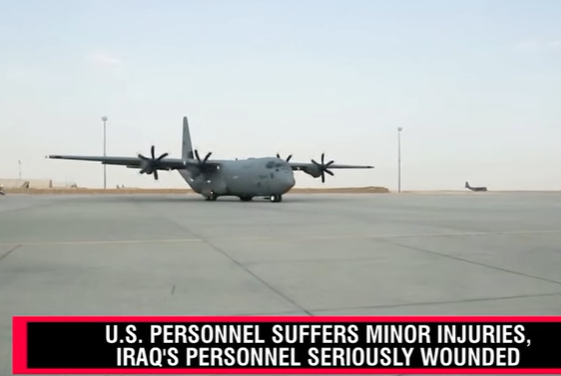
The Ain Al-Assad attack occurred on January 20, 2020. Source from CNN: https://www.youtube.com/
9. From a symbolic point of view, Iran has solved the task of saving face and responding to the attack on the consulate in Damascus. The Iranian military and political leadership demonstrates full satisfaction with the received pictures of Operation True Promise. In addition, Iran became the first state to directly strike Israel for the first time in several decades after Saddam Hussein — proxy strikes are not taken into account. Iran has also demonstrated that even with a limited strike, it can more or less break through the enemy’s prepared air defences head-on, which hints that, if desired, Iran can break through the air defences of the United States and Israel covering Tel Aviv, Haifa, or Dimona with an even more massive strike. Israel can be satisfied with the fact that the strike on the consulate in Damascus has now been played out, and the damage from the Iranian strike, due to its limited nature, will be equally limited for Israel. But of course, the point here is not only in material damage, although in addition to direct damage, we must also consider the cost of spending on both sides – on air defence, aviation, drones, etc., Israeli sources claim that Israel’s expenses alone exceeded $1 billion, and Iran spent several hundred million dollars.
10. Israel is now at a fork in the road. To strike directly at Iran means to receive a retaliatory missile strike, an even more powerful one, which is guaranteed to penetrate the Israeli air defence system. At the same time, the United States has already stated that it will not take part in attacks on Iran, hinting that Israel should limit itself to something like the usual strikes against Hezbollah and Iranian proxies in Syria. Similarly, the European satellites of the United States explicitly warn Israel against attacks on Iran. But this, of course, will be perceived in Israel itself as a sign of weakness, because Iran has shown that it can directly strike directly at Israel, which is the intersection of all Israel’s red lines. There will be no consolidated international condemnation of Iran, either in the UN Security Council or in the whole world, because Israel itself perverts UN Security Council resolutions and violates established international law by ignoring the Vienna Convention. Therefore, Iran will not be internationally isolated in connection with the strike, and Israel’s retaliatory strike against Iran will look exactly like a deliberate escalation on the part of Israel with a further increase in Israel’s toxicity outside the countries of the ‘golden billion’. Iran, on the other hand, has conquered the Muslim street and now revels in the role of the main defender of the Palestinians against the background of the peddlers and opportunists, [Turkish President Recep Tayyip] Erdogan and [Saudi Prime Minister Mohammed] bin Salman. It was Iran which made it so that for the first time in six months not a single bomb fell on the Gaza Strip. Well, footage of rockets flying at targets in Israel over Al-Aqsa will be in the mainstream of Shiite religious and political propaganda for many years to come.
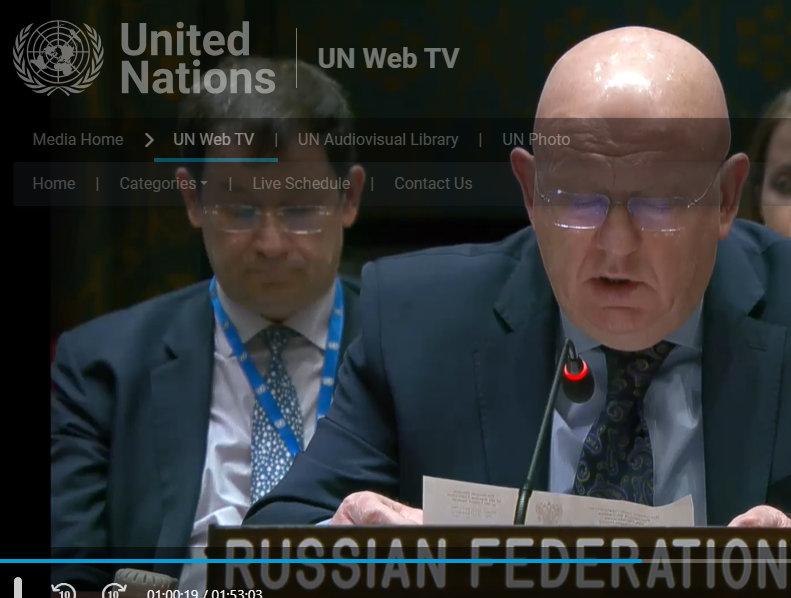
In the emergency meeting of the UN Security Council on April 14, the Russian representative Vasily Nebenzya attacked the UN Secretary-General, Antonio Guterres, for favouring Israel. “Yesterday [April 13] you instantly publicly reacted and condemned the actions of Iran…It is regrettable that, unlike the meeting today, you did not propose to brief the Council on the 2nd of April where, on Russian initiative, an emergency briefing was called to discuss the Israeli strike against the consular premises in Damascus”.
In general, Iran has solved its tasks and now the move is up to the United States and Israel.
NOTE: the lead images are, left, of Iranian weapons flying over the Al-Aqsa Mosque in Jerusalem; right, satellite picture of two missile strikes on runways at Israel’s Nevatim Air Base in the Negev, southern Israel. US media reports claim three other missiles hit hangars and a C-130 aircraft at Nevatim. Nevatim is believed to have been the launch point for the aircraft which fired the missiles against the Iranian consulate in Damascus on April 1 which killed seven senior IRGC officers and Syrian civilians. Four Iranian missiles reportedly hit the Ramon Air Base in the Negev, 90 kms from Nevatim.













Leave a Reply